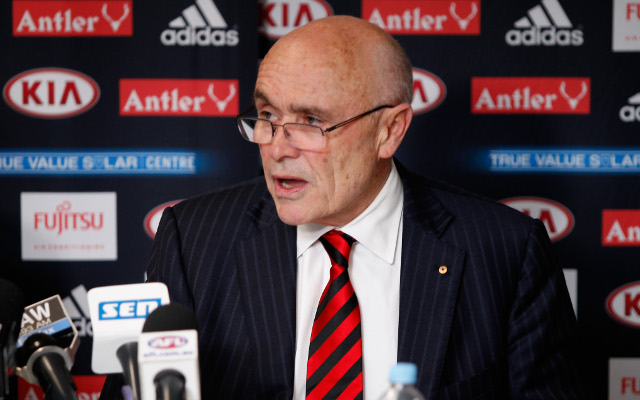Bombers make a stunning claim against the two authorising bodies.
Essendon Bombers chairman Paul Little has announced the club will launch a court challenge to the process and findings of ASADA probe into the club’s supplement program practices.
The club claims the action taken by ASADA in conjunction with the AFL was unlawful and in clear breach of the ASADA Act.
“Today, the Board of the Essendon Football Club convened to consider the latest developments with ASADA issuing ‘Show Cause’ letters to 34 of our players from 2012,” Little said.
“Giving consideration to the facts as we know them – and to the events that have transpired since February last year, the Board concluded unanimously that the Club is left with no alternative but to fight to protect the reputations and livelihoods of our players.
“As such, today we filed an application in the Federal Court of Australia challenging the legality of the AFL/ASADA Joint Investigative process and all that now flows from it.
“This challenge on the Joint Investigation is not merely a technical matter. The Application to the Federal Court seeks to enforce the rule of law. It seeks to hold accountable a Federal Government statutory agency and its CEO.
“The Club will contend the joint investigation was unlawful, that ASADA acted ultra vires and exceeded its power under its statute.
“There is no power or capacity under the ASADA Act to conduct a joint investigation. There never was.
“If we are right, and we believe we are, the Court will declare the investigation null and void. We will seek a permanent injunction on the use of all information collected in that investigation.
Alleged breaches of anti-doping rules were Friday levelled against 34 Australian Football League players following a 16-month investigation.
The Australian Sports Anti-Doping Authority (ASADA) said the decision to make formal allegations of possible violations was based on considerable evidence.
“Following the conclusion of joint interviews with the AFL in mid-2013, ASADA continued to accumulate evidence to establish a possible violation,” said ASADA chief executive Ben McDevitt.
“Based on the advice of our legal counsel and a review of the evidence … I have reached the conclusion that these players have a case to answer under the World Anti-Doping Code,” he said.
The players, accused of using a prohibited substance, were not named but media reports said they were past and current footballers from top side Essendon.
The substance was also not mentioned but reports have suggested it was a peptide thought to aid recovery from injury.
Essendon were not immediately available for comment but chairman Paul Little was expected to publicly respond later Friday.
The same club was last year hit with the biggest fine in the sport’s history and coach James Hird banned for 12 months for bringing the game into disrepute over a drug supplements scandal.
As well as being slapped with the Aus$2.0 million (US$1.8 million) penalty, the Bombers were kicked out of last year’s finals series.
AFL chief executive Gillon McLachlan said that the issue was “nothing more than allegations” at this stage.
“It’s essentially a proposition, an allegation to which they have to respond,” he told reporters.
“It’s just the start of a long process, it’s not an indication of guilt.”
The 34 players have 10 days to lodge their responses. That information, along with the evidence collected by ASADA, will then be put to the independent Anti-Doping Rule Violation Panel for consideration.
“Our priority is to ensure that Australian sport is clean and the health of athletes is protected,” said McDevitt, vowing to investigate any possible instance of doping.
“We want athletes to feel confident when they take to the arena that they are competing on a level playing field.”

COMMENTS